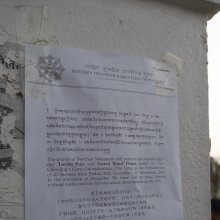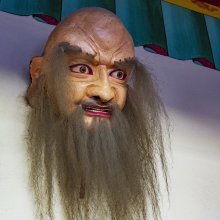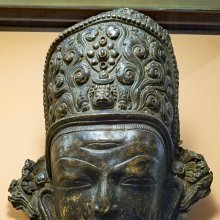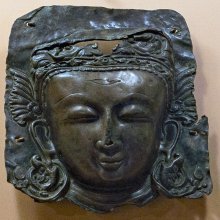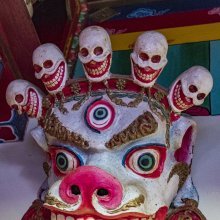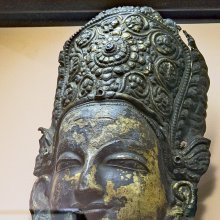Mask, Mashk: 9 definitions
Introduction:
Mask means something in Hinduism, Sanskrit, Hindi. If you want to know the exact meaning, history, etymology or English translation of this term then check out the descriptions on this page. Add your comment or reference to a book if you want to contribute to this summary article.
Images (photo gallery)
(+2 more images available)
In Hinduism
Natyashastra (theatrics and dramaturgy)
Source: Shodhganga: Elements of Art and Architecture in the Trtiyakhanda of the Visnudharmottarapurana (natya)Masks (of gods, demons, animals, etc.) in Indian Dramas are conveyed through the division of Prasta which itself is included under Āhāryābhinaya: one of the four divisions of Abhinaya or “ways to convey or represent one’s emotion to others”, according to the Viṣṇudharmottarapurāṇa, an ancient Sanskrit text which (being encyclopedic in nature) deals with a variety of cultural topics such as arts, architecture, music, grammar and astronomy.—The Viṣṇudharmottarapurāṇa says that Prasta denotes the making of artificial masks of gods, demons, demi-gods, different animals and birds etc. by clay, wood, cloth, leather and iron. In the Nāṭyaśāstra, the word pusta is used instead of prasta. The tradition of using different masks of gods, demons, birds etc. in Drama is still followed in Rāsa festival of Assam.

Natyashastra (नाट्यशास्त्र, nāṭyaśāstra) refers to both the ancient Indian tradition (shastra) of performing arts, (natya—theatrics, drama, dance, music), as well as the name of a Sanskrit work dealing with these subjects. It also teaches the rules for composing Dramatic plays (nataka), construction and performance of Theater, and Poetic works (kavya).
Languages of India and abroad
Sanskrit dictionary
Source: DDSA: The practical Sanskrit-English dictionaryMask (मस्क्).—1 P. (maskati) To go, move.
Source: Cologne Digital Sanskrit Dictionaries: Shabda-Sagara Sanskrit-English DictionaryMask (मस्क्).—r. 1st cl. (maskati) To go, to move: sometimes read maṣka .
Source: Cologne Digital Sanskrit Dictionaries: Benfey Sanskrit-English DictionaryMaṣk (मष्क्).—see mask.
--- OR ---
Mask (मस्क्).—maṣk MaṢK, and makk makk, i. 1, [Ātmanepada.] To go.
Source: Cologne Digital Sanskrit Dictionaries: Monier-Williams Sanskrit-English Dictionary1) Maṣk (मष्क्):—[varia lectio] for √mask q.v.
2) Mask (मस्क्):—[class] 1. [Ātmanepada] maskate, to go, move, [Dhātupāṭha iv, 28] ([Vopadeva] maṣk).
Source: Cologne Digital Sanskrit Dictionaries: Yates Sanskrit-English DictionaryMask (मस्क्):—(ṅa) maskate 1. d. To go.
[Sanskrit to German]
Sanskrit, also spelled संस्कृतम् (saṃskṛtam), is an ancient language of India commonly seen as the grandmother of the Indo-European language family (even English!). Closely allied with Prakrit and Pali, Sanskrit is more exhaustive in both grammar and terms and has the most extensive collection of literature in the world, greatly surpassing its sister-languages Greek and Latin.
Hindi dictionary
Source: DDSA: A practical Hindi-English dictionary1) Mashk in Hindi refers in English to:—(nf) a large leathern water-bag (used for sprinkling water on the roads, etc.)..—mashk (मश्क) is alternatively transliterated as Maśka.
2) Mashk in Hindi refers in English to:—(nf) practice; exercise..—mashk (मश्क) is alternatively transliterated as Maśka.
...
See also (Relevant definitions)
Starts with: Mashka, Maskanu, Maskara, Maskari, Maskarimarga, Maskarin, Maskarisamaya, Maskariya, Maskaunu, Maskevari, Maskhara, Maski, Masko, Masko, Masksha, Maskuwari.
Ends with: Artificial mask, Facial mask.
Full-text (+101): Makk, Mukhavata, Varnaka, Varnika, Chomukha, Pratishirshaka, Varnikaparigraha, Parshvamauli, Ankiya, Rupadem, Maskara, Dhanga, Mundamala, Tapasvin, Nirgrantha, Sadhaka, Kiriti, Parivraj, Shakya, Dhurta.
Relevant text
Search found 45 books and stories containing Mask, Maṣk, Mashk; (plurals include: Masks, Maṣks, Mashks). You can also click to the full overview containing English textual excerpts. Below are direct links for the most relevant articles:
Look Within < [April – June, 2008]
Yama-Pwe or The Ramayana Play in Burma < [October-December 1942]
Eugene O'neill and The Tragic Theatre < [January 1965]
Vishnudharmottara Purana (Art and Architecture) (by Bhagyashree Sarma)
1. The Viṣṇudharmottara-purāṇa and Modern Drama < [Chapter 6 - Modern Relevance of Different Art Forms and Architecture]
1.3. Elements of Drama (b): Costume and Make up < [Chapter 3 - Drama and Dance]
Puppetry in Assam (by Gitali Saikia)
Folk Theatre (e): Bharigan < [Chapter 6]
Folk Theatre (a): Kamrupia Dhulia < [Chapter 6]
Characteristics of Folk drama < [Chapter 1]
Yoga-sutras (Ancient and Modern Interpretations) (by Makarand Gopal Newalkar)
Sūtra 2.36 < [Book II - Sādhana-pāda]
Gati in Theory and Practice (by Dr. Sujatha Mohan)
Gati found in Chau of Eastern India < [Chapter 4 - Practice of Gati]
The Way of the White Clouds (by Anāgarika Lāma Govinda)
Chapter 36 - Mystery-plays < [Part 3 - Death and Rebirth]
Chapter 14 - The Nature Of The Highlands < [Part 2 - Pilgrim Life]
Chapter 40 - Magic as Method and Practical Knowledge < [Part 3 - Death and Rebirth]
Related products
(+10 more products available)
